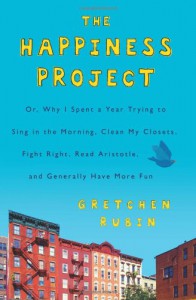4
Followers
19
Following
Lit Lovers Lane
Inveterate, incurable readaholic, who blogs about books and what's in 'em. If readaholism is a deadly disease, no problem. Couldn't imagine a better way to go.
The Happiness Project: Or, Why I Spent a Year Trying to Sing in the Morning, Clean My Closets, Fight Right, Read Aristotle, and Generally Have More Fun
 The non-fiction stunt genre. Before I read this book, I’d never heard this term, which refers to the wave of new authors who undertake an activity for a period of time and then chronicle the process. The name lends a somewhat unsavory whiff to this literature...indeed many would die rather than call it literature. Even I must admit to a bit of red-faced shame at having been snagged in the genre’s net with this purchase. But, as I read The Happiness Project, I let loose of my embarrassment with one of Ms. Rubin’s Happiness 12 Commandments -- Be Stephanie. Rather than twisting ourselves to like, be, or do what we feel we should like, be, or do, give in to the the truth of what floats our boat. How liberating. It sounds so simple really, like many of Rubin’s other ideas, but the devil is in the practice. Regardless, I decided to let my natural Stephanie reign, and I am so happy I did.
The non-fiction stunt genre. Before I read this book, I’d never heard this term, which refers to the wave of new authors who undertake an activity for a period of time and then chronicle the process. The name lends a somewhat unsavory whiff to this literature...indeed many would die rather than call it literature. Even I must admit to a bit of red-faced shame at having been snagged in the genre’s net with this purchase. But, as I read The Happiness Project, I let loose of my embarrassment with one of Ms. Rubin’s Happiness 12 Commandments -- Be Stephanie. Rather than twisting ourselves to like, be, or do what we feel we should like, be, or do, give in to the the truth of what floats our boat. How liberating. It sounds so simple really, like many of Rubin’s other ideas, but the devil is in the practice. Regardless, I decided to let my natural Stephanie reign, and I am so happy I did.Gretchen Rubin sets out to discover whether, by identifying and systematically neutralizing her personal happiness zappers, it is possible to increase not only her own happiness quotient, but that of those around her. Though she acknowledges some might find her endeavor frivolous, given her already quite satisfactory life circumstances, Rubin agrees with the ancient wisdom that adding happiness to one’s life will add happiness to the field, and increased happiness generates more good/more happiness for everyone. And, I agree.
What I like about this book is the engaging, friendly voice; the unflinching candor; the wealth of background research; the clearly organized presentation; and the simple, yet profound implications for our lives. After analyzing her personality traits, habits, and wishes, the author hones in on 12 aspects of her life to improve – one for each moth of the year. Accordingly, the book’s chapters are organized by months. In each month, Rubin explains her target, outlines the concrete method and resolutions she has devised to reach the target, and assesses whether the methods panned out for her. For instance, February is her Remember Love month with marriage as the focus. Rubin’s resolutions are to: quit nagging, give proofs of love, and not expect praise or appreciation. For each resolution, she develops specific steps/aids for improvement. As an example, to stop nagging, Rubin limits herself to one-word reminders to her husband rather than a longer, nasty order. Alternatively, she does the task herself. Interwoven in each chapter is relevant research and literature she has read on the particular topic, but while her reading list is exhaustive, she does not hit the reader over the head with it. Instead, she presents the background material in interesting, cogent, easily digestible bits. Then, at each month’s end, the author evaluates progress, and here I find Rubin unsparingly candid. When something doesn’t work for her, she admits it and tosses it out the window. This, together with her honesty regarding her perceived bad habits and failings she wants to work on, impresses me.
Finally, what most excites me is The Happiness Project’s implications for the rest of us. If you are like me, you have probably traveled over hill and dale to try a host of self-improvement methods AND paid an arm and a leg for the privilege. But what Ms. Rubin lays out, for those of us who consider ourselves only mildly insane, is a systematic, self-directed way to improve our happiness levels without depending on anyone else or handing over our first-born child in payment. And I adore that prospect.
If I have any apprehension or criticism of the work, it would be only that so ambitious was her project that, at times, I was overwhelmed and felt tired just reading about what she attempts to try. She starts a reading group; she tries to make 3 new friends at every gathering; she writes a novel in 30 days; she keeps a gratitude book – the list goes on and on. She adds so many new activities to what appears to be an already full life that I was almost sick thinking about if it were me. But what I remind myself is that everyone’s happiness project is supremely personal, both in content and volume. In the end, I cannot praise Gretchen Rubin’s “stunt” enough, and I will definitely be incorporating her work into my life


